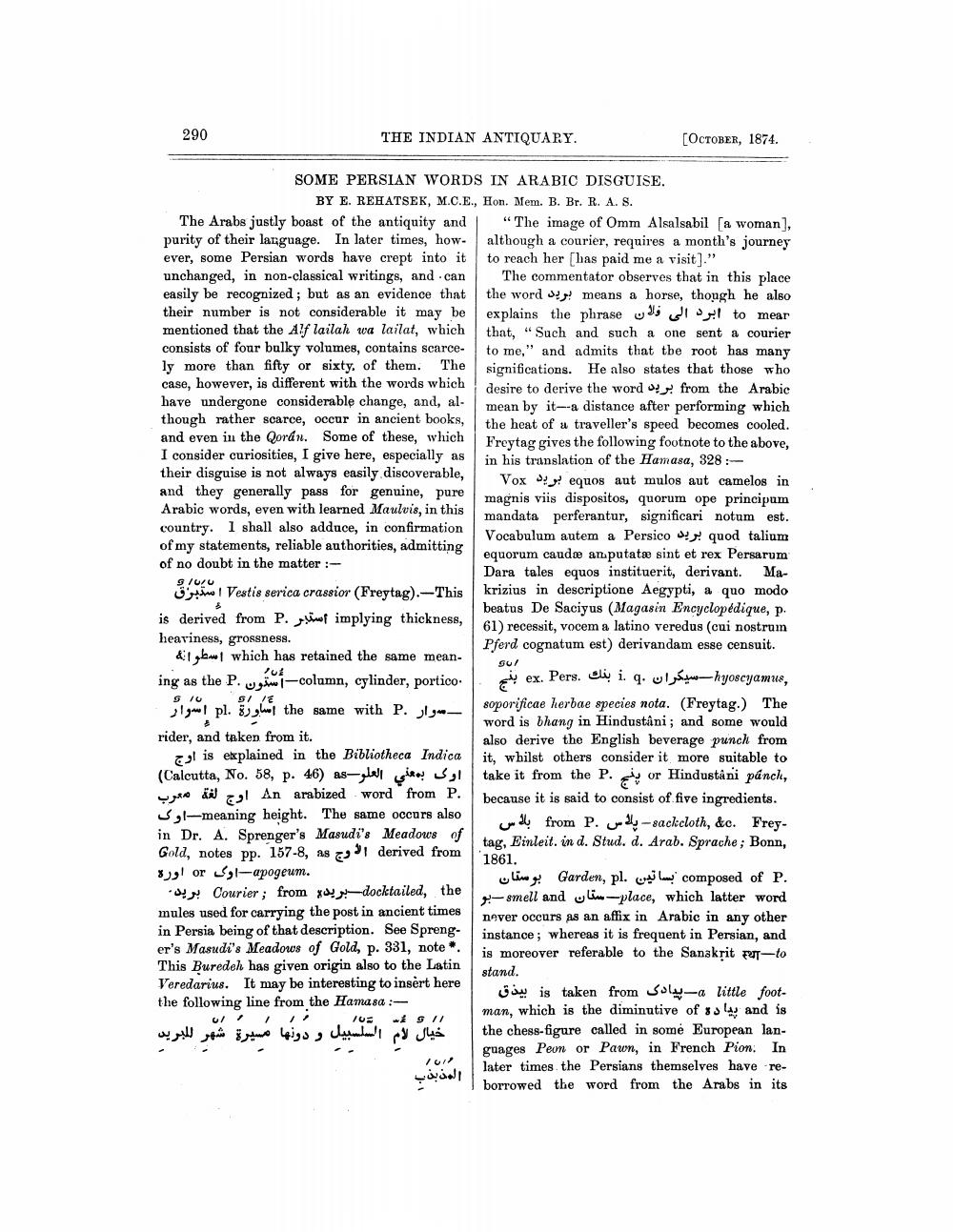________________
290
SOME PERSIAN WORDS IN ARABIC DISGUISE. BY E. REHATSEK, M.C.E., Hon. Mem. B. Br. R. A. S. The Arabs justly boast of the antiquity and purity of their language. In later times, however, some Persian words have crept into it unchanged, in non-classical writings, and can easily be recognized; but as an evidence that their number is not considerable it may be mentioned that the Alf lailah wa lailat, which consists of four bulky volumes, contains scarcely more than fifty or sixty, of them. The case, however, is different with the words which have undergone considerable change, and, although rather scarce, occur in ancient books, and even in the Qorán. Some of these, which I consider curiosities, I give here, especially as their disguise is not always easily discoverable, and they generally pass for genuine, pure Arabic words, even with learned Maulvis, in this country. I shall also adduce, in confirmation of my statements, reliable authorities, admitting of no doubt in the matter :
9/0/0
Vestis serica crassior (Freytag).-This
品
is derived from P. f implying thickness, heaviness, grossness.
which has retained the same meaning as the P.-column, cylinder, portico.
702
S 10
SI JE
THE INDIAN ANTIQUARY.
ـــوار .the same with P اساورة .pl اسرار
اوج
rider, and taken from it.
is explained in the Bibliotheca Indica (Calcutta, No. 58, p. 46) as-Sal
soporificae herbae species nota. (Freytag.) The word is bhang in Hindustâni; and some would also derive the English beverage punch from it, whilst others consider it more suitable to take it from the P.. or Hindustani panch, because it is said to consist of five ingredients. -meaning height. The same occurs also from P.-sackcloth, &c. Freyin Dr. A. Sprenger's Masudi's Meadows of tag, Einleit. in d. Stud. d. Arab. Sprache; Bonn, Gold, notes pp. 157-8, as 1 derived from
1861.
.An arabized word" from P اوج لغة عرب
.apogeum-او or اور
docktailed, theبرید Courier; from برید.
mules used for carrying the post in ancient times in Persia being of that description. See Sprenger's Masudi's Meadows of Gold, p. 331, note*. This Buredeh has given origin also to the Latin Veredarius. It may be interesting to insert here the following line from the Hamasa:; /
017
102
SII
خيال لام السلسبيل و دونها مسيرة شهر البريد
1017
المقالب
"The image of Omm Alsalsabil [a woman], although a courier, requires a month's journey to reach her [has paid me a visit]."
The commentator observes that in this place the word means a horse, though he also explains the phrase to mear that, "Such and such a one sent a courier to me," and admits that the root has many significations. He also states that those who desire to derive the word from the Arabic mean by it--a distance after performing which the heat of a traveller's speed becomes cooled. Freytag gives the following footnote to the above, in his translation of the Hamasa, 328:
[OCTOBER, 1874.
Vox equos aut mulos aut camelos in magnis viis dispositos, quorum ope principum mandata perferantur, significari notum est. Vocabulum autem a Persico quod talium equorum caudæ amputatæ sint et rex Persarum Dara tales equos instituerit, derivant. Makrizius in descriptione Aegypti, a quo modo beatus De Saciyus (Magasin Encyclopédique, p. 61) recessit, vocem a latino veredus (cui nostrum Pferd cognatum est) derivandam esse censuit.
105
,hyoscyamus-سيكران 10 .1 بنك .ex. Pers پنج
پنج
.composed of P بساتين .Garden, pl بوستان
-smell and l-place, which latter word never occurs as an affix in Arabic in any other instance; whereas it is frequent in Persian, and is moreover referable to the Sanskrit -to stand.
-a little foot-پیادک is taken from بيدق
man, which is the diminutive of sal and is the chess-figure called in some European languages Peon or Pawn, in French Pion. In later times the Persians themselves have reborrowed the word from the Arabs in its




